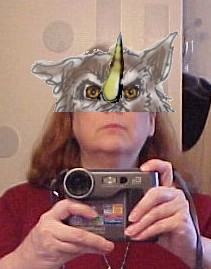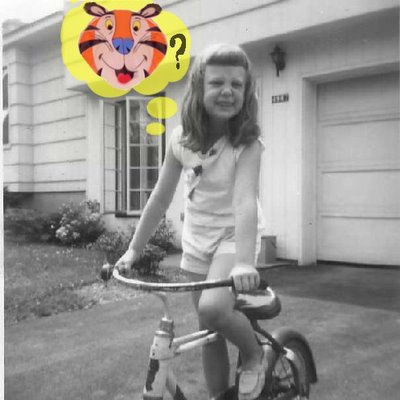Extra credit: Would you want to own the animal you identify with?
 Sometimes John Scalzi's Weekend Assignments feel like almost-reruns when they're not, because I previously wrote about a similar subject for the Round Robin Photo Challenges, or even just on my own. In this case, there was a Round Robin challenge a year and a half ago, called "The Animal Within." Over the course of two nights' entries, I wrote about a childhood fantasy of trying to communicate that I'd been transformed into a tiger, and how that eventually led to my writing about Rani Fost, a teenaged boy who becomes an animal called a tengrem. There are definitely times when I'd like to replicate Rani's experience, not in outward appearance but in truly knowing what it's like to experience the world through sensory impressions and instinct, rather than intellectualizing every moment.
Sometimes John Scalzi's Weekend Assignments feel like almost-reruns when they're not, because I previously wrote about a similar subject for the Round Robin Photo Challenges, or even just on my own. In this case, there was a Round Robin challenge a year and a half ago, called "The Animal Within." Over the course of two nights' entries, I wrote about a childhood fantasy of trying to communicate that I'd been transformed into a tiger, and how that eventually led to my writing about Rani Fost, a teenaged boy who becomes an animal called a tengrem. There are definitely times when I'd like to replicate Rani's experience, not in outward appearance but in truly knowing what it's like to experience the world through sensory impressions and instinct, rather than intellectualizing every moment.None of this really answers Scalzi's question, though. It's one I find nearly impossible to answer, and a trifle annoying even to consider. It's always bothered me that humans insult or criticize each other using animal metaphors. I doubt that there's anything especially sleazy about a real weasel, for example. And women are objectified and debased under a bunch of animal names: cow, b-ch, fox, sow, nag, chick, hen, and so on. None of this has much to do with the actual animal, but in most cases it's an insult to both the animal and the woman.
Setting all that aside, though, let's try to do the assignment as written. Am I most like a dolphin, who is clever, friendly and highly verbal, but not so good on handling objects? A parrot, who can talk intelligibly and understand the words of others? A wolf, who sometimes travels with the pack but other times is alone? A mockingbird, singing all night? A tiger? A tengrem?
 I suppose on the whole, I have to go with the obvious answer: a dog. Despite that maxim about old dogs, canines can learn a number of tasks, and are generally eager to please. Dogs are greedy for food and approval, keep irregular hours and are a bit lazy; but they usually get on well with people and are good at communicating with them. Check, check, check check check!
I suppose on the whole, I have to go with the obvious answer: a dog. Despite that maxim about old dogs, canines can learn a number of tasks, and are generally eager to please. Dogs are greedy for food and approval, keep irregular hours and are a bit lazy; but they usually get on well with people and are good at communicating with them. Check, check, check check check!And of course, I've owned one or more dogs continuously since my senior year in college, and hope to do so for the rest of my life. Growing up in a house where at least one person was allergic to all the major kinds of pet except fish and possibly turtles, I always longed to have a dog. I collected bone china dog figurines, and planned a career as a dog breeder, whose specialty would be to breed purebred Pomeranians back up to sled dog size. I even remember petting dogs when at age 15 I toured Europe with my family, almost as pleased to do that as to step into the Louvre.
Really, though, the answer I want to give is that I'm most like a human, that fascinating, complex, contradictory animal which often tries to pretend, in its arrogance, that it's not an animal at all. Even when I'm writing about Rani at his most feral, chasing down foxes, grazing or growling, ultimately what I'm trying to examine is an aspect of the human condition. When we apply animal metaphors to people, what we're really trying to do is understand ourselves and each other, identifying traits and putting labels on them.
Ultimately it doesn't help much. Humans are too varied in their abilities and their reactions, their triumphs and their faults, their reasoning and their emotions, ever to be crammed into a tiger or a tabby cat, a pig or a pomeranian, a cow or a chicken. We are what we are: homo sapiens, that knowing animal that walks on two legs and thus looks down on other animals as something apart from us, or like us in a few handily labeled traits. Stuck inside our own human experiences, our unique way of viewing the world, we cannot truly know what it means to be a dog or a pig or a monkey. Heck, we don't really know what it means to be human; our own species continually surprises us with its brilliance and idiocy, kindness and cruelty, and any other behavioral continuum you care to name.
But it's interesting to consider, as Desmond Morris and others have done, how animal behavior works, and how some of those same imperatives underly our own behavior. Humans sometimes form packs of one sort or another, fight over territory, seek to protect our young, and on and on. Hmm. Maybe there's something in this animal comparison business after all.
Karen

No comments:
Post a Comment